BLOG
Find support not just for emotional eating, but all aspects of your well-being.
Real Scripts You Can Use this Holiday Season
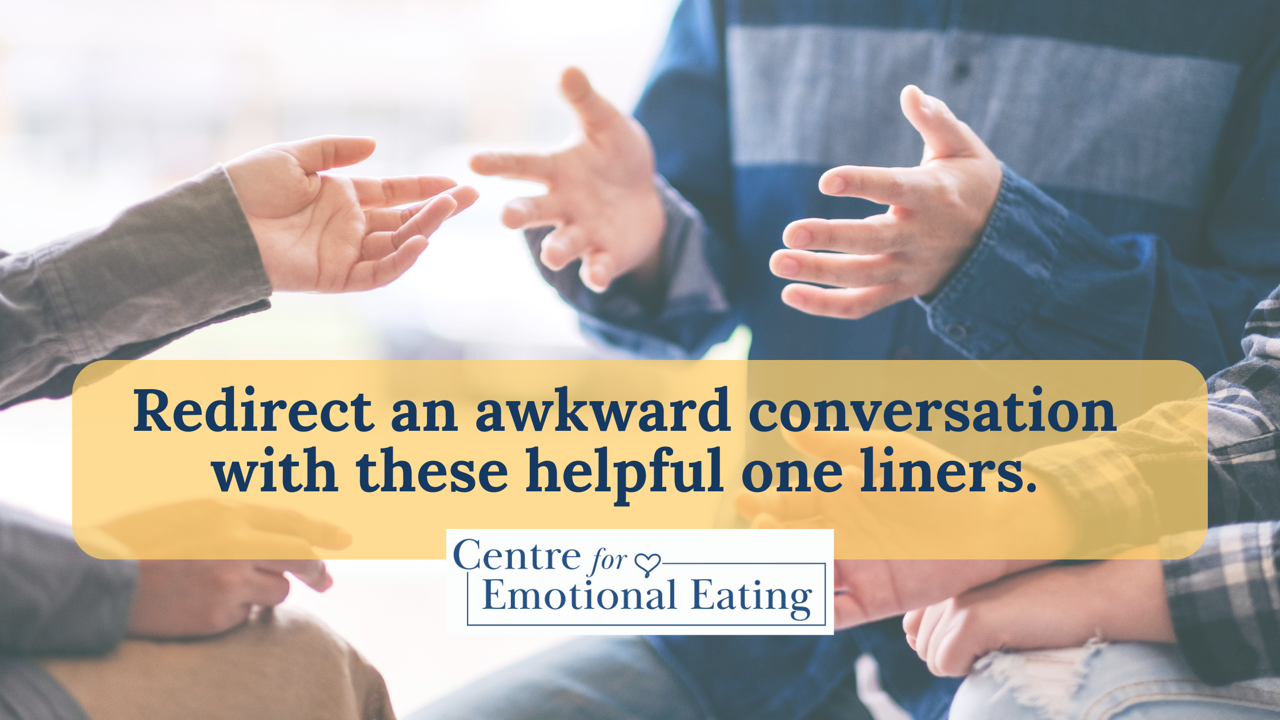
Social gatherings can be stressful at the best of times: they require your time, energy, money, and you have to figure out what to wear. Add in the expectation that someone will comment on your weight, what you’re eating, how you vote, or how you choose to live your life and the anxiety can build as soon as the event is on your calendar.
If you are already dreading a few get-togethers on your calendar, below are some helpful scripts you can use to shut down unwanted comments and criticism. Read through and choose which ones might be helpful to you. Feel free to bookmark this blog post or take a screen shot on your phone so you can come back to this anytime you need to feel empowered to redirect an uncomfortable conversation.
Try being warm and polite:
- “It’s the holiday season, let’s focus on the positive. What are you excited about right now?”
- “Let’s keep things light today. Tell me something wonderful that’s going on with you lately?”
Try being gentle but clear:
- “That is ...
How to Set Personal Boundaries
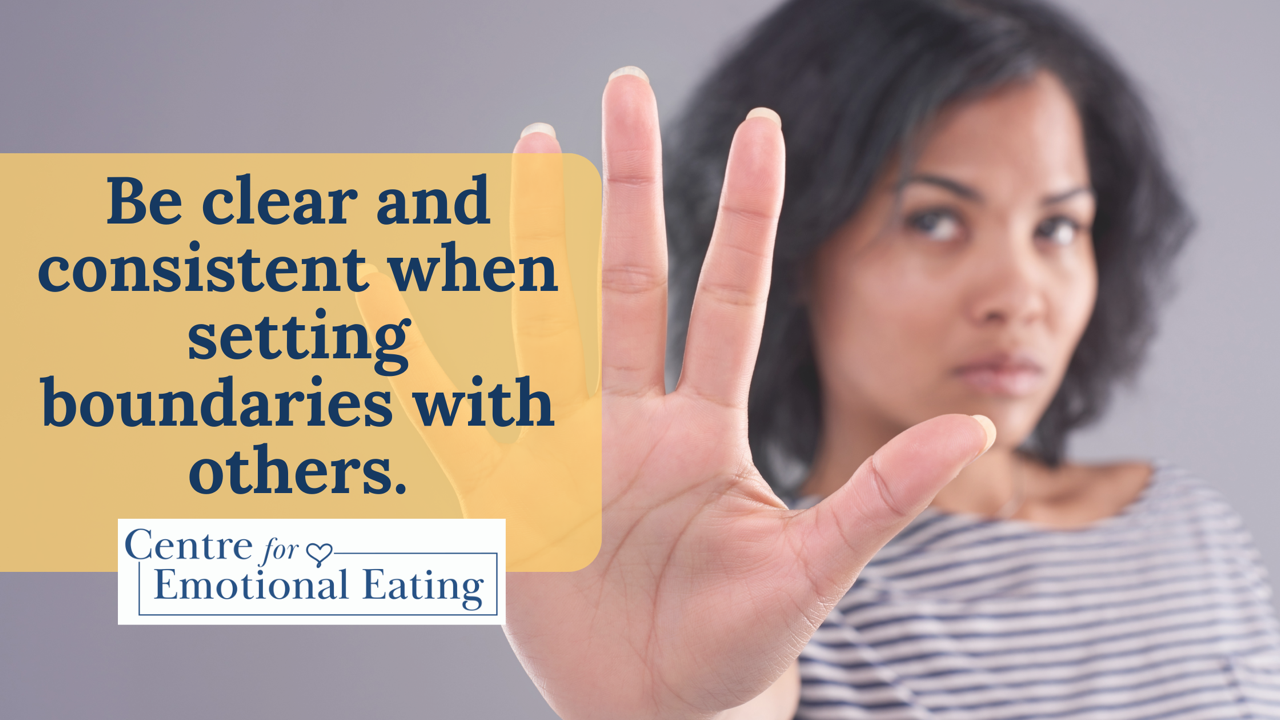
Setting boundaries with other people can feel very challenging. It pushes against our desire to keep the peace, challenge those we love, out of fear of rejection. But they are an essential part of maintaining your well-being and healthy relationships.
Benefits of Boundaries
Your boundaries are personal to you—they’re the guidelines you set to protect your body, mind, energy, and lifestyle. That’s a pretty powerful thing. For example, setting boundaries with others can include how frequently or quickly you respond to calls and texts, saying “no” when you don’t have time or interest in something, or pushing back on critical comments.
While you might feel uncomfortable to set boundaries, doing so can support your mental health, financial stability, help you feel more confident, and even create healthier relationships. Often others will respect you for knowing what you are and aren’t comfortable with, and stick with it.
While you may need to communicate your boundaries to others, you d...
Reparenting: Learning to Support the Younger You
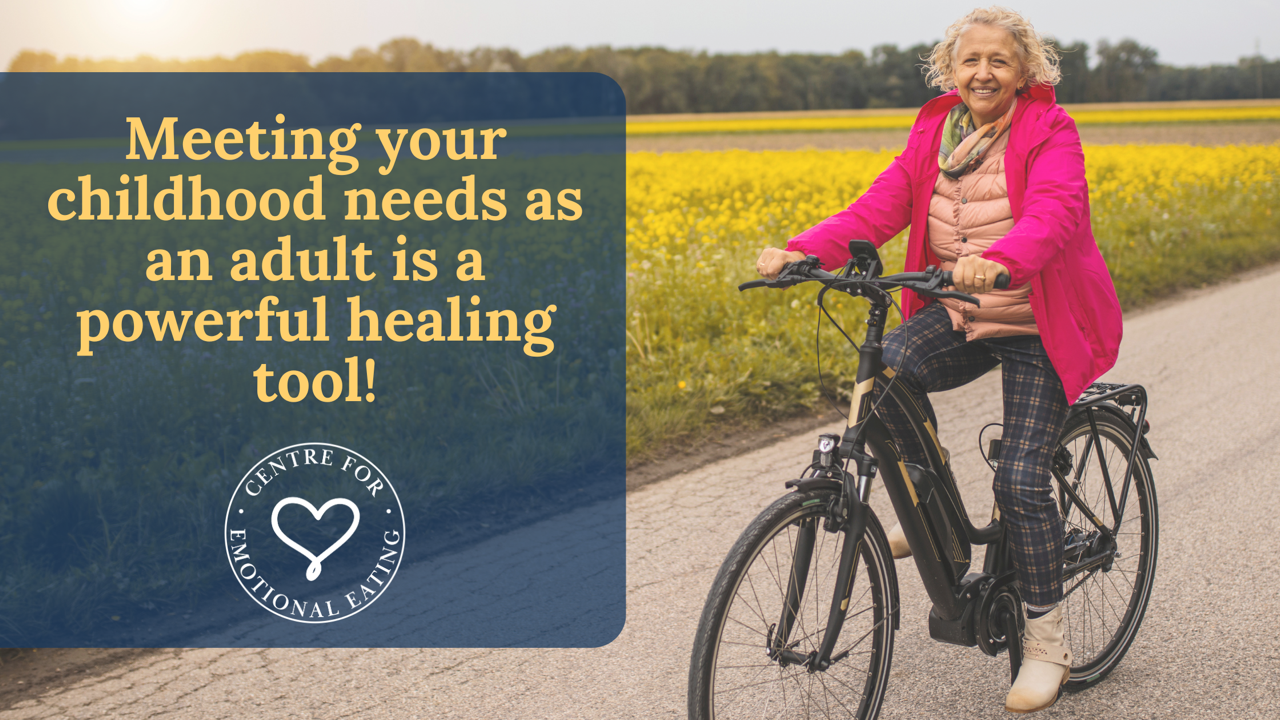
Often here at the Centre for Emotional Eating we talk about how your patterns and habits with food are influenced not by the cravings themselves, but the root cause behind what makes you act.
For many, the root cause can be found in childhood or adolescent experiences. This is because as our brains and bodies grow, we are learning and are influenced by examples displayed around us—to finish what’s on our plate, diet talk, stuffing down emotions, just to name a few. We learn from parents, caregivers, teachers, coaches, siblings, and friendship circles! But not all of these lessons will serve you as you grow into your own adulthood, some might be downright painful or destructive.
It is incredibly common to reach a point in your adult life and know things need to change but not know how. This is where therapy can be a very helpful tool in helping you sort through your thoughts and feelings, gain confidence to make your own decisions, and help you feel more resilient.
And one effective ...
Retrain Your Brain: Finding Happiness Outside of Food

There are many reasons people emotionally eat: to distract themselves, to feel numb, to have something to control. But one of the common reasons I hear from clients is that food brings them a sense of happiness that they feel doesn’t compare to any other experience currently in their life. This makes emotional eating incredibly difficult to stop relying on when you don’t have others ways of accessing this feel-good emotion. Does any of this sound familiar?
- A snack feels like an only acceptable break from grinding away at work or your to do list. Your brain makes the connection that not working = food.
- You only feel your body relax once the kids are in bed and you can eat alone in the evening. The connection your brain makes here is alone time = food time.
- You only allow yourself to have foods like cake or popcorn at events like parties or at the movie theatre. Here your brain connects special events (happy times) and specific foods.Our brains love to work on auto-pilot because it ...
Let’s Talk About It: The Rising Popularity of GLP-1 Drugs
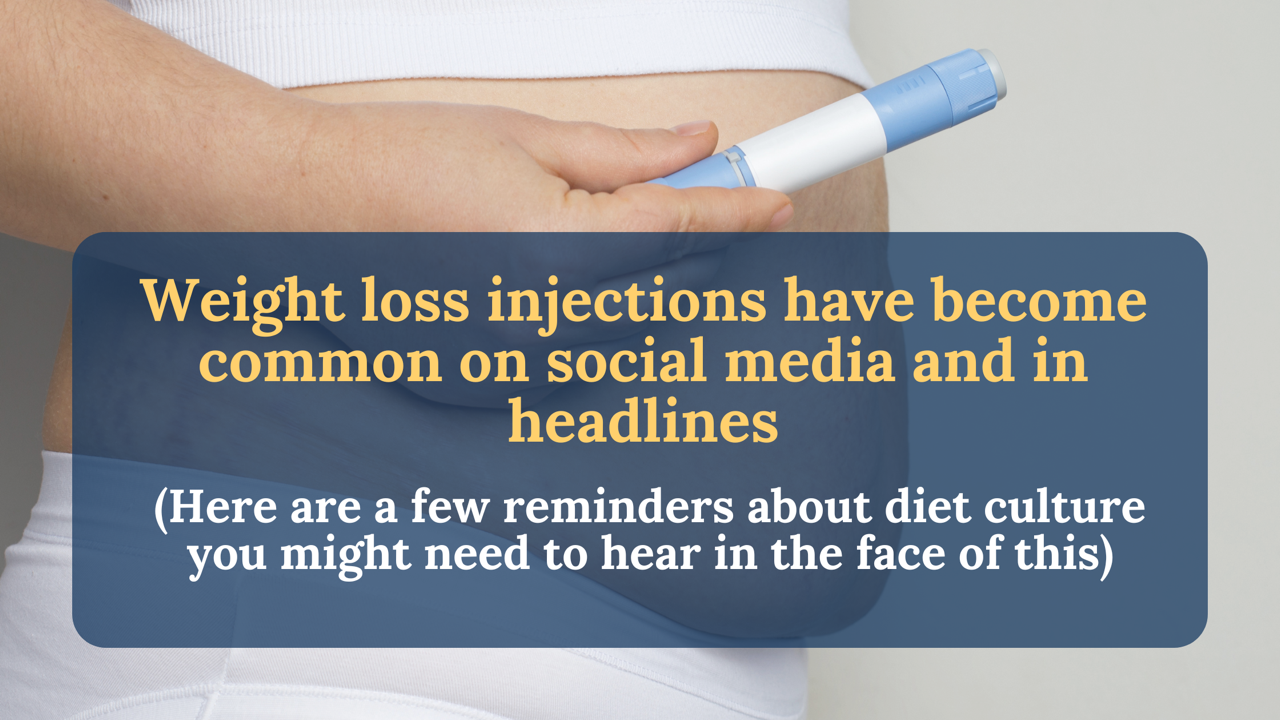
It seems impossible to ignore the presence of GLP-1 medications, you might have heard them being called Ozempic or Wegovy. Diet culture seems to have evolved from a focus on willpower to injections that can give you the “body of your dreams.”
It can be especially difficult to see celebrities who were previously promoting body positivity and self-love admit to taking weight loss injections. It can feel like a betrayal. And some, like influencers on social media, aren’t being transparent about their use of the drug but continue to say only diet and exercise are responsible for their results.
Plus, all these headlines, photos, and videos can make you hyper-aware of your own body as we’re encouraged to compare ourselves to others. You might find your emotional eating—reminder, that can include restricting too—ramps up the more you’re faced with this kind of content. It can be a constant reminder that weight loss is celebrated and only one body type is “acceptable.”
Here are some loving ...
Why We Engage in Self-Sabotage Behaviour
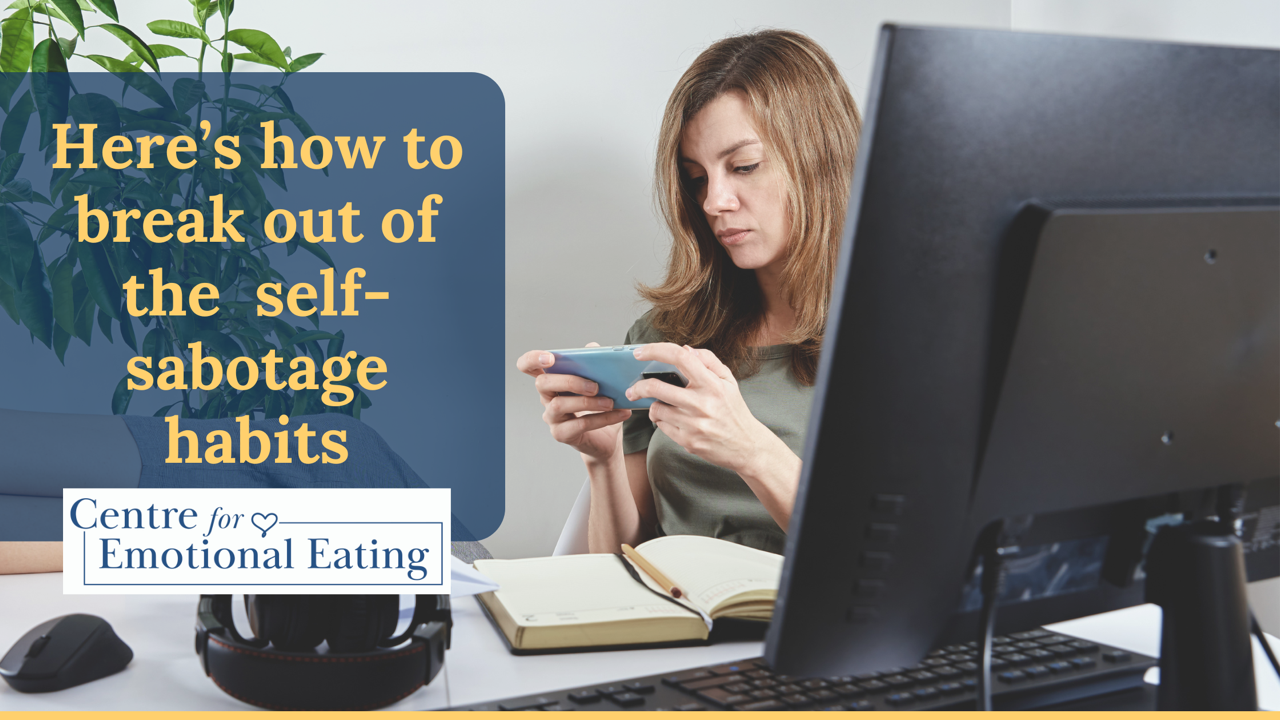
Self-sabotage is a sneaky habit that is getting in the way of, well, yourself! You might have recognized your patterns, even be aware it doesn’t make you feel good, but feel helpless to stop the action. Self-sabotage keeps you feeling stuck because there is familiarity in the outcome. Yes, it might leave you feeling shame or overfull but it feels safe.
Self-sabotage behaviour can look like:
- Perfectionism. Needing everything to be perfectly aligned and ready before taking action. But the truth is “perfect” doesn’t exist, meaning you’ll never end up taking that step forward.
- Procrastination and avoidance. It is easy to pick up our phones and scroll or focus on what foods we want to binge on as a way to numb out rather than face something.
- Constant self-doubt and criticism. This can be feeling like you never measure up or that you can’t possibly meet your goals, so why even try.
These patterns of self-sabotage show up not just around a fear of failure, it can also come up as a fe...
Three Ways to Manage Your Emotions

Emotional eating bubbles up when you don’t want to feel or experience something. Food is always available and seems like an easier route than facing things head on. But the truth is, your feelings just want to be heard and comforted by you. That is the key to breaking out of the emotional eating cycle, not more will power.
This sense of confrontation can feel very scary when you’ve spent years avoiding your feelings, so we’re sharing 3 great ways to get your emotions out in a way that will help you recognize them and move through them—instead of being stuck in the trigger-eat-regret cycle:
Use your voice. One of the best ways to help diffuse the intensity of your emotions is to talk to yourself out loud. This might feel silly at first, but it can be a great way to identify what exactly you are feeling. Find a space alone (the bathroom is a great one!) and start to find your words, for example: “I am feeling really attacked right now”, “I’m so worried I disappointed them and they are ...
There Are No Negative Emotions

As an emotional eater you might feel like you can identify emotions as either good or bad.
Hope, joy, satisfaction, those must be good because they make you feel positive and present.
Anxiety, sadness, anger, those must be bad because they feel uncomfortable and challenging.
This is called black-and-white thinking or sometimes referred to as all-or-nothing thinking. Chances are you learned this way of thinking from family and society. Were you ever told to hide what you were feeling to make others more comfortable? Or maybe you were told that emotions are weak or to “put your big girl pants on.” Just like labeling foods as either good or bad, approaching emotions the same way doesn’t allow for the truth: that there is a much more neutral, or grey, area.
Let’s reframe! What if instead of thinking of certain emotions as bad, you replace that thought with a neutral one like “there are no bad emotions.” This neutrality means we’re not pretending to be happy or applying a toxic positivi...
How to Avoid the Social Media Comparison Trap

Social media constantly gives us benchmarks to compare ourselves to.
Your Instagram and TikTok feeds are filled with picture-perfect videos and photos of happy kids, clean houses, and expensive vacations. These platforms are also overwhelmed with weightless “success” stories and details of restrictive diets to try to ‘give’ you the body of the influencer posing on the screen.
It’s tough not to get caught up in these images! It’s true that a picture is worth a thousand words, so even before reading the caption or hearing what they’re saying, the image they are projecting is perfection. They are trying to sell you on the idea that if you buy this, do that, you can look just like them, have a life just like theirs.
Talk about a comparison that is only going to make you feel bad about yourself.
But this slim slice we see of others online—a highlight reel—is no yardstick for your own messy, beautiful life!
Here’s the solution to social media comparison:
- You’ve probably heard this be ...
What is Holiday Perfectionism? (And How to Let Go if It!)

Holiday movies and social media show us that the holiday season needs to be a certain level of perfect: everyone must be happy, your house must be spotless but also have decorations everywhere, and key memories have to be made. This is what is considered holiday perfectionism, when everything must be done to a certain level or else you feel stressed out, disappointed in yourself, or like a failure.
Women are especially susceptible to falling into the trap of holiday perfectionism because they constantly get messages from childhood to be everything to everyone. They are the ones to make the gift lists, do the shopping, the baking, coordinate the social calendars of spouses and kids. Plus, there is a gender stereotype that women need to be pleasant in the face of any scenario. It is exhausting!
Give yourself a break this year with these 4 tips to feel less stressed about achieving perfection this season:
- Take stock of what you can let go of. Consider what you think is expected of yo ...


